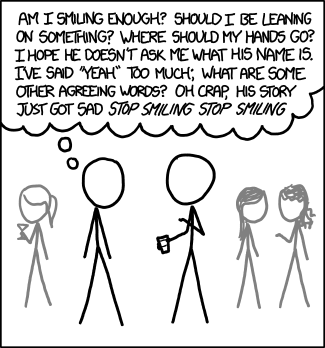1089: Internal Monologue
Explanation[edit]
Cueball attempts social interaction at what looks like a party owing to the fact that several people have drinks in their hands. His internal monologue is just Cueball trying to make sure he is doing the right things in the conversation, reacting appropriately, and not saying "yeah" too much.
The title text is a continuation of the internal monologue.
This is common case of anxiety for people who are usually not very skilled in navigating social situations like parties. It can become a vicious cycle in which the fear of handling the encounter badly makes one even more uncomfortable, which in turn results in behaviour as awkward as first feared. Also, for some people it's common to want to map out a pre-planned course of action that should produce desired results, a strategy that is usually doomed to failure when dealing with sufficiently complex and unpredictable scenarios like conversations with other people. This painful, and all too common, situation has been mined for comedic effect since the beginning of human civilization.[citation needed]
This situation is especially common and difficult for autistic people, and the learned (conscious or automated) effort to appear neurotypical is known as masking and is a near-constant source of mental drain for many. Small talk and appropriate eye contact, both mentioned in this comic, are well known to be difficult for many autistic people.
Transcript[edit]
- [The scene is a party. Two characters are talking - the entirety of the text is a thought bubble of one of the two.]
- Cueball: Am I smiling enough? Should I be leaning on something? Where should my hands go? I hope he doesn't ask me what his name is. I've said "yeah" too much; what are some other agreeing words? Oh crap, his story just got sad stop smiling stop smiling
Discussion
This is a common anxiety for geek types, who stereotypically are not very skilled in navigating social situations like parties. It can become a vicious cycle where the fear of handling the encounter badly makes one even more uncomfortable which results in behaving as awkwardly as they first feared. Also, for many geek type personalities, it's common to want to map out a pre-planned course of action that should produce desired results. A strategy that is usually doomed to failure when dealing with sufficiently complex and unpredictable scenarios... like conversations with other people. This painful, and all too common situation has been mined for comedic effect since the beginning of human civilization.
Should someone mention how this is a common experience for autistic people known as masking? 172.70.251.3808:02, 18 November 2023 (talk) (please sign your comments with ~~~~)
Discussion From Comments[edit]
Joe Green - Yes I like the participatory and discursive nature of the comments. Also in this instance I find myself wondering why Cueball is hoping that OtherCueball “doesn’t ask me what his name is”. That would be a very strange thing to ask. Well, except in the form “do/don’t you know who I am?”
- BigMal - It’s more like “I know he introduced him/herself earlier, but I already forgot, and he probably remembers my name, so if he asks me to recall his name I’d be caught (and embarrassed)!”
- Joe Green - “if he asks me to recall his name” Well yes, but I just thought that was an unlikely thing for someone to do in such a direct way. Cueball *could* end up being embarrassed in that kind of way though if a friend of his joined the conversation and he wanted to introduce OtherCueball.
- Harm - My solution to situations like that is something like “Go on, introduce yourselves,” and then standing back.
- Thisfox: He's assuming there'll be a test at the end. Another geek type thing to do.108.162.249.190 09:26, 7 May 2015 (UTC)
- Harm - My solution to situations like that is something like “Go on, introduce yourselves,” and then standing back.
- Joe Green - “if he asks me to recall his name” Well yes, but I just thought that was an unlikely thing for someone to do in such a direct way. Cueball *could* end up being embarrassed in that kind of way though if a friend of his joined the conversation and he wanted to introduce OtherCueball.
FredG - I think some of the humor of this comic also comes from the fact that in literature and film, a character's "internal monologue" is much less nervous stream-of-consciousness and is usually mostly inappropriate or satirical comments on the situation.
- Kyle - On the other hand, "Adaptation" actually features a lot of "nervous stream-of-consciousness" narration.

